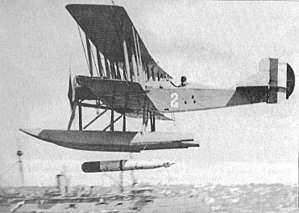Short Mark 7 torpedo
The Short Mark 7 torpedo was a variant of the Bliss-Leavitt Mark 7 torpedo developed by the Washington Navy Yard in order to fit certain submarine torpedo tubes in 1917. The Short Mark 7, also designated Torpedo Type D,[2] had an air flask that was shortened and a reduced warhead weight. The fuel and water tanks were relocated to obtain more air flask capacity; the fuel tank was mounted in the aft air flask bulkhead, while the water tanks were mounted in the after-body. The overall weight of the warshot torpedo was 590 pounds lighter and 58 inches shorter than the Mark 7. The air, fuel and water capacities were approximately one-third of the capacities found on the full-size Mark 7. This torpedo was never produced in quantity.
| Short Mark 7 torpedo | |
|---|---|
 Dummy Mark 7 Type D torpedo being dropped from a Curtis R-6L ca. 1919 | |
| Type | Torpedo |
| Place of origin | United States |
| Service history | |
| Used by | |
| Production history | |
| Designer | Washington Navy Yard |
| Designed | 1917 |
| Specifications | |
| Mass | 1036 pounds |
| Length | 144 inches |
| Diameter | 17.7 inches (45 centimeters) |
| Effective firing range | 2000 yards |
| Warhead weight | 281 pounds |
Detonation mechanism | Mk 3 contact exploder |
| Engine | Turbine |
| Maximum speed | 35 knots |
Guidance system | Gyroscope |
Launch platform | Submarines |
See also
- American 18 inch torpedo
References
- "United States of America, Torpedoes Pre-World War II". Retrieved 25 June 2013.
This article is issued from Wikipedia. The text is licensed under Creative Commons - Attribution - Sharealike. Additional terms may apply for the media files.